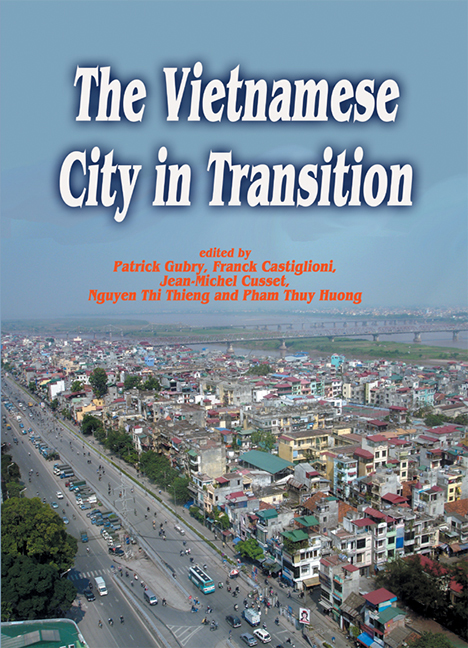Book contents
- Frontmatter
- Contents
- List of Tables
- List of Figures
- List of Colour Plates
- Foreword
- Acknowledgments
- List of Acronyms
- The Editors
- The Contributors
- Introduction: Urban Research in Action: Context, Aims, Directions
- 1 Urban Transition in Vietnam: Its Processes and Stakeholders
- 2 Road System and Urban Recomposition in Hanoi
- 3 Intra-Urban Mobility in Ho Chi Minh City and Hanoi
- 4 Resettlement Issues of Informal Settlement Areas in Ho Chi Minh City: From Large-scale Programmes to Micro-projects
- 5 Changes in Public Water Management: Transition, Compromise, and Innovation
- 6 The Role of Civil Society in Urban Environmental Management
- 7 Assessment of Projects Supported by Official Development Assistance Based on Partnership Formats: From Ho Chi Minh City to Hanoi
- 8 Relations between International Consultants and the Local Engineering Force in Urban Infrastructures
- 9 Conclusion: A Diverse Approach to Research on Urban Issues
- General Bibliography
- Index
- Plate Section
5 - Changes in Public Water Management: Transition, Compromise, and Innovation
Published online by Cambridge University Press: 21 October 2015
- Frontmatter
- Contents
- List of Tables
- List of Figures
- List of Colour Plates
- Foreword
- Acknowledgments
- List of Acronyms
- The Editors
- The Contributors
- Introduction: Urban Research in Action: Context, Aims, Directions
- 1 Urban Transition in Vietnam: Its Processes and Stakeholders
- 2 Road System and Urban Recomposition in Hanoi
- 3 Intra-Urban Mobility in Ho Chi Minh City and Hanoi
- 4 Resettlement Issues of Informal Settlement Areas in Ho Chi Minh City: From Large-scale Programmes to Micro-projects
- 5 Changes in Public Water Management: Transition, Compromise, and Innovation
- 6 The Role of Civil Society in Urban Environmental Management
- 7 Assessment of Projects Supported by Official Development Assistance Based on Partnership Formats: From Ho Chi Minh City to Hanoi
- 8 Relations between International Consultants and the Local Engineering Force in Urban Infrastructures
- 9 Conclusion: A Diverse Approach to Research on Urban Issues
- General Bibliography
- Index
- Plate Section
Summary
For nearly two decades now, the “decentralization, privatization and liberalization” triangle touted in adjustment policies has become the new paradigm for development in all parts of the world. Yet, effective implementation of institutional decentralization coupled with an appeal to the private sector to promote open competition and growth is failing to impact all countries uniformly. A case in point is Vietnam with its socialist-oriented market economy. Is it going through a gradual transition towards a liberal economy? Compromising between internal constraints and external demands? Or, rather, going the way of innovation, seeking a specific model that has not yet fully taken shape?
In Vietnam, the “transition/compromise/innovation” pathways are fraught with complexity and uncertainty, something we can confirm by taking a look at urban water distribution.
To begin with, in the early 1990s transition was the buzzword in neoliberal strategies applied to contexts that were still recently collectivist. Transition was needed on two fronts — from collectivism to capitalism and from underdevelopment to development. But it is noteworthy that the transformations that took place in Vietnam (Doi Moi, 1986) predated generalization of the notion of transition. Chronologically, the notion of transition was not the force behind the remake that took place in the late 1980s. Rather, it sprung from new national public policy directions and gave them a meaning they did not previously have (the march to liberalism). The transition idea in a way came to the rescue in a story of radical upheavals, the like of which had not been planned or anticipated. But perhaps not wanting to lose out on any new history-making advancement and convinced that valuable lessons could be learned from the recent remake, it was thought that transition should be something predictable and applicable to social action in general.
From both the economic and political standpoint, the concept of transition came to mean both a liberal and democratic model that had become unavoidable and toward which economically collectivist countries were invited to turn.
- Type
- Chapter
- Information
- The Vietnamese City in Transition , pp. 133 - 166Publisher: ISEAS–Yusof Ishak InstitutePrint publication year: 2010

